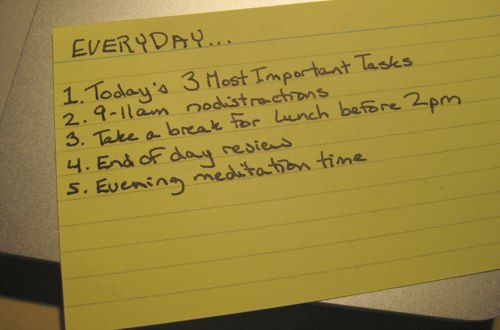Top ten reasons managers become assholes
In response to angry comments about the large number of mean or incompetent people in management circles, here’s the first in a series of posts about them. (There is also a positive follow up post on the top ten reasons managers become great):
The top ten reasons managers become assholes:
- A boss they admired was an asshole. In trying to emulate someone more powerful than themselves, they didn’t separate the good qualities from the bad and copied it all. In their admiration they defend the bad along with the good (note: people do this with their parents too). See The Jobsian Fallacy.
- They are insecure in their role. The psychology of opposites goes a long way in understanding human nature. Overly aggressive people are often quite scared, and their aggression is a pre-emptive attack driven by fear: they attack first because they believe an attack from others is inevitable. Management makes many people nervous since it’s defined by having have less direct control, but more broad responsibility. Many managers never get over this, and micromanage: a clear sign of insecurity and confusion over their role and yours.
- They prefer intimidation to leadership. If you have a gun, the fastest way to get someone to do something for you is to threaten them with it. But if you take away the gun, you have no power. However if you take the time to convince someone to do something for good reasons, those reasons can last no matter how armed or unarmed you are. A person who has confused intimidation with persuasion, or leadership, behaves poorly all the time. They rely on their guns, not their minds, which prevents the people who work for them from using their minds too.
- They are unhappy with their lives. What percentage of people are miserable in the corporate world? I think 20-30% is a safe bet. If you’re miserable, you tend to inflict your misery on those who have less power than you do. If your life is miserable enough you won’t even notice how rude you are to waiters, assistants, and sub-ordinates. It may be nothing personal, or even work related, these people simply have a volcano of negative emotions that must escape somewhere, often in eruptions that they can not control. Just be glad you’re not their spouse or offspring.
- They lose their way. Management is disorienting. You are not in the real world in the same way front line workers are. Everything is meta. Decisions become abstractions. People are numbers. Getting lost in middle management is common. Unless they find a guiding light to keep the bearings, and stay low to the ground, good people get lost. It’s smart when taking on a new role to ask someone closer to the ground to be your sanity check. Telling you when the front lines thinks you’re not the same guy anymore.
- Promotion chasing. As you get further from front line work, the goals of promotion become clearer than the goals of the projects. Often what’s right for the project, and the people working on it, isn’t lined up with what’s going to get a manager promoted. This creates a moral dilemma, do what’s right for the team, or do what’s best for me. By spending more time with other managers than with front line workers, it’s easy to forget where the high ground is.
- Their management chain is toxic. If you are a manager, and your boss is inflicting blame, disorder or pain on you, there are two choices. Either pass the pain on down, or suck it up and shield your team from the pain. Will you pass the blame on to your team, or take all the heat? The latter is much harder to do than the former, and the former will often be taken as being an asshole. Even if no solution is possible, one gutsy thing to say is “I don’t agree with this either, but I was unable to convince my boss, so we’re doing it anyway”. This takes guts as it makes you seem powerless. You must choose between seeming powerless vs. seeming like an asshole, and the latter often wins.
- The Peter Principle. A 1968 book described this principle as the fact that in any hierarchy, every employee tends to rise to his level of incompetence. It sounds like a joke, but makes total sense. If Bob is a great marketer, he is soon promoted to senior marketer. If he does well, he’s promoted to managing marketers. What happens now? If he’s mediocre as a manager, he can likely stay there forever. He may not like the fact he’s not getting promoted anymore and doesn’t like being mediocre, but is afraid of going back down the ladder, even though he might excel down there. He’s trapped. People who are trapped feel insecure (see above).
- They’re not assholes, they’re just insensitive or oblivious. Would a Vulcan make a good manager? Not really. He’d make smart choices, for sure, but empathy is a huge part of what a decent manager offers their team. Managers are often faced with tough decisions that will negatively affect people, and they make the best choice they can. But they forget to empathize with or explain their decisions such that those negatively effected by them understand. Or even better, forget to involve those people in the decision so they become participants and not victims. The failure to do this is a fast way to earn a reputation as an asshole, even if you’re doing what’s best for the team / company / world.
- Madly in love with themselves. Perhaps their Mom doted on them too much as children, or they got picked on in high school, whatever the reason, some people become infatuated with their power and fall in love with themselves. They put themselves in the center of everything because, emotionally, they need to be. The hole in their ego is so big, nothing can fill it, despite their pathological attempts to stuff bonuses, rewards, kudos and perks others deserve more into their stash. Megalomania is tragedy. It’s a good sign a person you despise has bigger problems with the world, than you have with them.
- They always were assholes. I knew a kid in elementary school who always seemed like a jerk. Even then it wasn’t quite his fault, he just naturally annoyed and bothered people. Why? I don’t know. Anyway, I met him recently, 25 years later, and guess what? He’s still a jerk. Some people have been, and probably always will be, assholes. They have to work somewhere. Better managed companies hire fewer of them.
- They took the promotion purely for money and status. In many organizations the only way to get higher status and more income is to become a manager. What if managers didn’t get paid more than the people they managed? Perhaps then more people would take the role simply because they wanted to be in that role, rather than because they primarily wanted more money.
Related:
- Bob Sutton’s recent book The No-Asshole rule is worth a look if this post reminds you of someone you work with.
- How to survive a bad manager
- The 200+ comment post on asshole driven software development.
- A companion post, called Top ten reasons managers become great.



 Design and project management have a secret love affair that explains why good things happen. It’s only when the creatives and the PMs are working in sync that the best ideas and designs can make it out the door. What good is a great idea without a schedule that makes it possible? Why bother with a detailed schedule if it kills the creative energy of the entire team? It’s only when you master design & PM together that the good stuff makes it to customers.
Design and project management have a secret love affair that explains why good things happen. It’s only when the creatives and the PMs are working in sync that the best ideas and designs can make it out the door. What good is a great idea without a schedule that makes it possible? Why bother with a detailed schedule if it kills the creative energy of the entire team? It’s only when you master design & PM together that the good stuff makes it to customers.